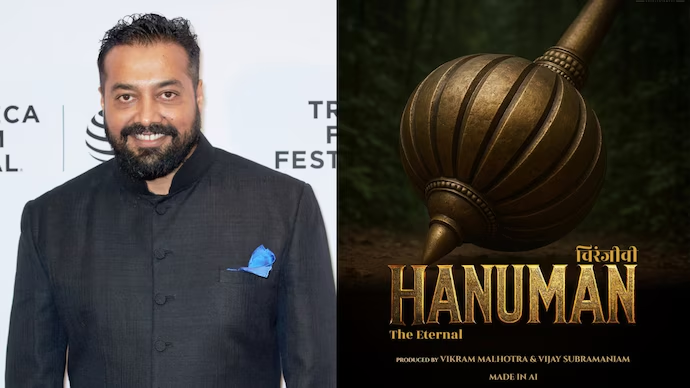The film industry is witnessing a new wave of technology, with Artificial Intelligence (AI) slowly entering the realm of content creation. Recently, the AI-made film ‘Chiranjeevi Hanuman’ sparked a controversy when acclaimed filmmaker Anurag Kashyap criticized its producer Vijay Subramaniam. This blog will discuss the background of the film, the arguments from both sides, and what it means for the future of Indian cinema. If you’re curious about AI’s role in films and the ongoing debate, this article has you covered.
Background of the AI-Made Film ‘Chiranjeevi Hanuman’
‘Chiranjeevi Hanuman’ is one of the first Indian films largely created using AI technology. The movie claims to use AI not only in visual effects but also in scripting, editing, and music composition. Producer Vijay Subramaniam spearheaded this pioneering project, presenting it as a new frontier in filmmaking that blends creativity with cutting-edge technology. The film generated buzz as an experimental venture that questioned traditional filmmaking methods.
Anurag Kashyap’s Concerns About AI in Filmmaking
Anurag Kashyap, known for his deep involvement in Indian cinema and support of innovation, did not hold back his concerns about ‘Chiranjeevi Hanuman.’ He criticized the film, saying that AI should not replace human creativity and that filmmaking is an art deeply rooted in human emotion and experience. Kashyap pointed out that:
-
AI lacks the emotional depth and nuanced understanding that human filmmakers bring to the screen.
-
Using AI to create films may reduce opportunities for artists, writers, and technicians.
-
AI films risk becoming soulless, lacking the human touch that connects audiences to stories.
His criticism sparked a heated discussion about the line between innovation and preserving tradition.
Vijay Subramaniam’s Role and Response to the Criticism
Producer Vijay Subramaniam defended his project by highlighting the potential AI has to enhance filmmaking. According to him:
-
AI can handle tedious tasks like editing and data processing, freeing up artists to focus on creativity.
-
The film is a collaborative effort where AI works alongside humans, not replaces them.
-
Innovation should not be feared but embraced, as it can open new ways to tell stories.
He acknowledged the concerns but asserted that AI-made films are not meant to replace traditional cinema but to explore new creative possibilities.
The Debate: AI Creativity vs. Human Filmmaking
This controversy represents a larger debate in the film industry globally: Can AI be truly creative? Or is filmmaking an exclusively human art? Key points include:
-
Supporters of AI: Believe it can speed up production, lower costs, and introduce fresh ideas.
-
Critics of AI: Fear AI lacks intuition, empathy, and imagination essential for storytelling.
-
Middle Ground: Suggests AI could be a tool that enhances human creativity rather than replaces it.
This debate is ongoing, with strong opinions on both sides.
Industry Reactions to the ‘Chiranjeevi Hanuman’ Controversy
The film industry audience and professionals have mixed feelings about the controversy:
-
Some filmmakers admire the bold experiment and welcome AI to expand creative boundaries.
-
Others worry that AI might threaten jobs and dilute the craft of filmmaking.
-
Critics remain divided, with some praising technical innovation but questioning artistic value.
Social media and film forums have seen lively discussions, showing growing awareness but also uncertainty about AI’s role.
Ethical Implications of Using AI in Films
Using AI in cinema raises ethical questions every creator must consider:
-
Ownership: Who owns the rights to AI-generated content? The human creators or the tech developers?
-
Job Displacement: Will AI reduce work opportunities for actors, writers, editors, and others?
-
Authenticity: Can AI-generated films genuinely convey human experiences?
-
Bias and Representation: AI systems might carry biases, leading to unfair portrayals.
These issues highlight the complexity of integrating AI into creative industries responsibly.
Impact of AI on Future Film Production in India
India’s film industry, one of the largest in the world, is watching this development closely:
-
AI could transform workflows, making production more efficient and cost-effective.
-
It might enable new storytelling formats, including interactive or personalized films.
-
However, the industry must balance technology adoption with protecting creative jobs.
-
Training and upskilling filmmakers to work with AI will be crucial.
The ‘Chiranjeevi Hanuman’ case serves as a case study for Indian producers and studios.
What This Controversy Means for Producers and Directors
For producers and directors, this controversy signals a need to:
-
Stay informed about AI’s capabilities and limitations in filmmaking.
-
Engage in conversations about ethical and creative concerns related to AI.
-
Explore ways AI can complement rather than replace human talent.
-
Anticipate changes in audience expectations and industry standards.
In a rapidly changing landscape, adaptability will be key to success.
Audience Opinions on AI-Generated Films
The wider audience’s reception is vital for AI cinema:
-
Some viewers are fascinated by tech-driven films and curious to watch AI experiments.
-
Traditional moviegoers often prefer emotional depth and storytelling crafted by humans.
-
Many feel uncertain if AI films will resonate on a personal level.
Audience feedback will shape the future acceptability of AI-made films.
The Future of AI Technology in Indian Cinema
AI technology is here to stay, and its role in Indian cinema will likely grow. The future could include:
-
Hybrid films where AI assists human creativity.
-
New genres and interactive experiences designed with AI tools.
-
Better visual effects and editing capabilities powered by AI.
-
Ongoing debates about ethics, creativity, and industry impact.
The film industry must embrace dialogue and experimentation while upholding artistic values.
Conclusion
The Anurag Kashyap criticism of producer Vijay Subramaniam over the AI-made film ‘Chiranjeevi Hanuman’ marks a crucial moment in Indian cinema’s evolving relationship with technology. While AI offers exciting possibilities, it also poses challenges involving creativity, ethics, and employment. This debate reflects broader questions about the human role in art and the future of storytelling. As the industry moves forward, finding a balance between innovation and tradition will be essential. For audiences, the conversation invites reflection on what truly makes cinema meaningful—a question that AI and humans will continue to explore together.
Read More: https://chennaiprint.in/indian-cricket-team-2025-asia-cup-full-squad-player-list/



